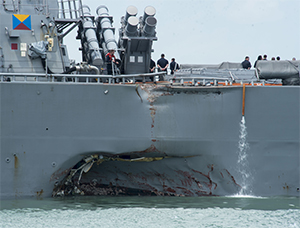A U.S. Navy report on collisions involving USS Fitzgerald and USS John S. McCain with merchant ships last year, killing 17 Navy sailors, has found that the warships’ crews could not cope with the developing scenarios due to lack of preparation, ineffective command and control, and deficiencies in training and preparation for navigation.
“Both of these accidents were preventable and the respective investigations found multiple failures by watch standers that contributed to the incidents,” Chief of Naval Operations Adm. John Richardson said in a prepared statement in November. “We must do better.”
Numerous failings by leadership and watch standers were cited for the June 17 collision involving Fitzgerald and the Philippine containership ACX Crystal off the coast of Japan, according to the Comprehensive Review of Recent Surface Force Incidents, which was released Nov. 2. The issues included failure to adhere to sound navigational practice, failure to execute basic watch-standing, failure to properly use navigational tools and failure to respond deliberately and effectively in a crisis. Seven Navy sailors were killed in the incident.
Causes cited for the Aug. 21 collision of McCain and the Liberian tanker Alnic MC in the Strait of Malacca were loss of situational awareness in response to operating mistakes while underway in a high-traffic water, failure to follow the Rules of the Road, and insufficient knowledge and proficiency by the watch standers operating McCain’s steering and propulsion systems. Ten U.S. sailors died.
A failure to maintain training certificates on both guided-missile destroyers was a contributing factor, according to the Navy. The entire 7th Fleet had failed to maintain training standards, and training requirements were frequently waived. Fitzgerald had expired training certificates for all 10 essential warfare mission areas in June, and McCain had lapsed certifications in six mission areas.
However, the issue of lapsed training certificates should be put in context, according to former Vice Adm. Douglas Crowder, now the president of a consulting firm. Crowder served as commander of the 7th Fleet, Navy Destroyer Squadron 24 and the USS Abraham Lincoln carrier strike group, among many other postings.
“I don’t think it was a determinative finding at all that there wasn’t training going on,” he said. “I think the issue in many cases was that certifications had expired.”
As commanding officer, it was Crowder’s responsibility to make sure his crew was trained. For example, “if I thought my bridge watch wasn’t well trained, I would stop until it got well trained.”
Training issues alone cannot be blamed for the collisions, he said.
“What the collisions have caused for the surface Navy, in my view, is ripping open a wound and looking down in there,” Crowder said. “There hasn’t been basic training; you haven’t done crew rest very well. There is no way I can point to any of those as the one reason for the collisions.”
Crowder did point to the closing of a naval training program as a problem. Starting in the 1970s, all new surface warfare officers spent six months at a designated school in Newport, R.I. It was a rigorous six months that gave new officers from around the country essential training, he said.
“Then in 2003, the Navy decided we were going to shut that down and give CDs to these junior officers,” Crowder said, referring to a box of 21 compact discs given to the officers to use to learn at sea. “In hindsight, it is easy to say (ending the training program) was a bad idea.”
In addition to problems with basic seamanship and training, the Navy has a culture problem, according to the report. It included analyses of a May collision involving USS Lake Champlain and a fishing vessel, and the grounding in January 2017 of USS Antietam.
“In each of the four mishaps, there were decisions at headquarters that stemmed from a culturally engrained ‘can do’ attitude and an unrecognized accumulation of risk that resulted in ships not ready to safely operate at sea,” the report said.

